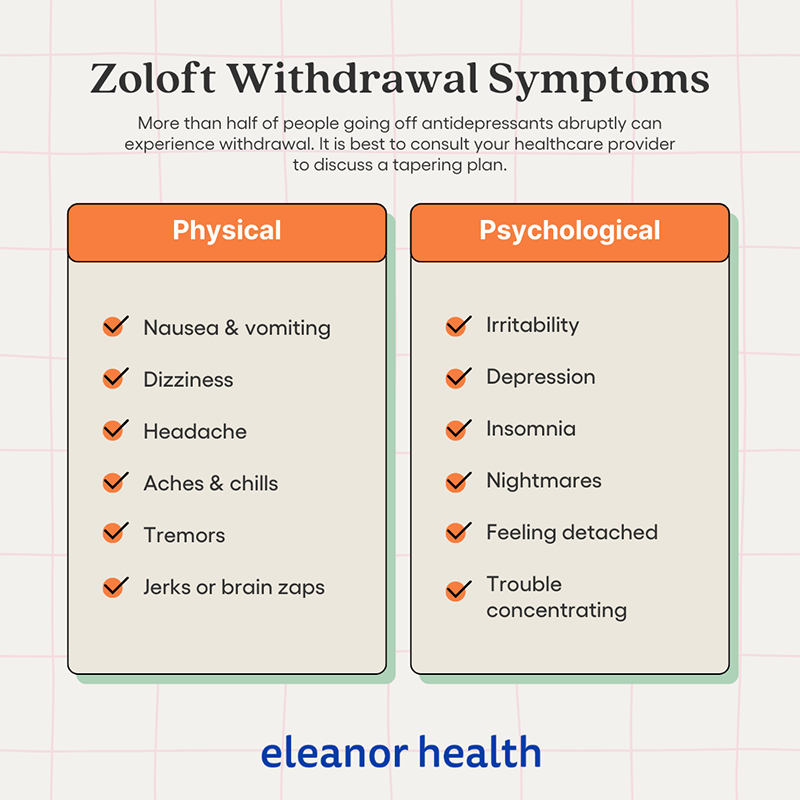Zoloft belongs to the selective serotonin reuptake inhibitor (SSRI) class of antidepressant medication and is often used to treat a variety of mood and anxiety disorders. While it is advised to continue taking your antidepressant medication, if effective, for someone taking the medication long term and wants to get off, has side effects that are not able to be tolerated, or is not having improvements on a therapeutic dose, stopping the medication may be an appropriate choice. However, getting off any medication has risks and SSRIs in particular can have a discontinuation syndrome if not properly tapered off.
According to a review of studies on the incidence of antidepressant discontinuation syndrome, more than half of people going off antidepressants abruptly can experience withdrawal symptoms. What symptoms can you expect, and how do you manage them? Continue reading to learn more about Zoloft withdrawal symptoms and how to get the care you need.
As stated above, Zoloft, also known as sertraline, is a selective serotonin reuptake inhibitor (SSRI), which is a class of medications that increase serotonin levels in the brain. Stable serotonin levels can improve sleep, memory, appetite, mood and anxiety. Zoloft in particular is FDA-approved to manage the following disorders.
In addition, the medication can be prescribed off-label to treat symptoms of a number of additional disorders including generalized anxiety disorder, binge eating disorder, body dysmorphic disorder, bulimia nervosa and premature ejaculation.
This medication helps people gain control over their mood and anxiety, which in turn improves their quality of life. To note, many individuals who find Zoloft to be a good match for them find relief within 2-6 weeks on an optimized dose as it can take time for the brain to adapt and improve symptoms.
However, some people find that they cannot tolerate side effects of Zoloft, have not found long term benefits, or no longer want to be taking medication. This can lead to the decision to stop taking Zoloft cold turkey, which can be difficult for the body to adjust to. It is thought that an abrupt decrease in serotonin levels can lead to withdrawal symptoms, so it is safest to follow a tapering plan. Withdrawal symptoms resolve over time, are not life-threatening, and are reversible with proper adjustments to tapering, however they can still be concerning to patients who are struggling with them.

Common symptoms of antidepressant discontinuation syndrome include the following:
Physical symptoms
Psychological symptoms
While some of these symptoms are similar to those experienced in cases of anxiety and depression, they do not necessarily signify a relapse. However, without proper management, the risk of relapse is still present. For individuals coming off Zoloft, uncontrolled depression symptoms can develop again and even escalate to suicidal ideation or self harm, seen more often in children and adolescent populations.
If you experience suicidal thoughts, you should seek professional help immediately. For help to overcome suicidal thoughts, you can call 988 Lifeline to talk to a counselor. 988 is a suicide and lifeline crisis network available 24/7. It provides free and confidential support to people in distress (emotional and suicidal crisis).
The first step to managing withdrawal symptoms is to work closely with a healthcare provider who can help guide you through the tapering process and make it easiest to tolerate for you. If you want to work on additional ways to lessen the severity of withdrawal symptoms, we have listed some below.
Specific lifestyle changes can help you reduce the duration of Zoloft withdrawal symptoms. Examples include:
Managing the mental symptoms of withdrawal can be challenging. You do not have to go through the process alone. Find a family member or friend who can support you emotionally. Furthermore, local support groups assist in giving you tips and making you feel less alone. You can also speak with a therapist or your medication provider for more support.
Withdrawal can be an uncomfortable process. Therefore, self-care is necessary for the most comfortable recovery. Some ways you can practice self-care include the following:
If you do experience withdrawal symptoms, how long they last may vary depending on the duration you’ve been taking Zoloft and the dosage amount. Usually, the symptoms last at most up to two weeks.
While you can taper off of Zoloft on your own, it is best to consult your healthcare provider to work together on a tapering plan so withdrawal symptoms can be avoided altogether. Generally, reducing gradually is the best method, and you should try and stick with each lowered dose for at least two weeks before reducing further. Update your prescriber on any side effects or worsening of mood/anxiety symptoms you may experience.
Eleanor Health Can Help You Recover
At Eleanor Health, we provide comprehensive and compassionate care for members struggling with substance and alcohol use disorders. Many people use substances to lessen mental health symptoms and we can help provide you with support, guidance, therapy and assistance managing medications to best stabilize without the need for drugs or alcohol. We have clinics in Louisiana, Massachusetts, New Jersey, North Carolina, Ohio, Texas, and Washington. Contact us to see what treatment options work best for you.
 The Link Between Anxiety and Alcohol
The Link Between Anxiety and Alcohol
 Do I Have Depression?
Do I Have Depression?
 Medication For Anxiety and Depression Medication: A Guide
Medication For Anxiety and Depression Medication: A Guide